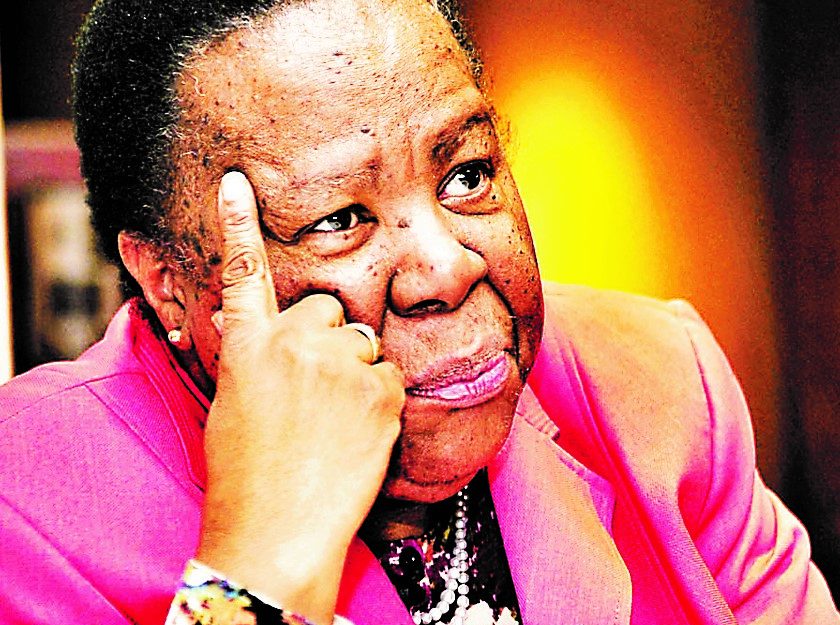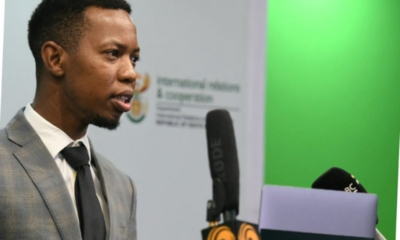
Banner

Pandor hints at more pragmatic approach to Israel
South Africa’s Minister of International Relations and Cooperation, Naledi Pandor, has openly acknowledged Israel’s right to exist in peace and security as a Jewish state, and that South Africa’s planned embassy downgrade could be stopped or reversed.
She was speaking last Wednesday in a Department of International Relations and Cooperation (DIRCO) portfolio committee meeting focused on recent developments in the Middle East.
“We believe the outcome must be a two-state solution, with two sovereign states existing in peace and security side by side. There has been no deviation from that objective. It stands as the policy of our country and our government,” said Pandor, amongst other points.
“The moment there is a movement that indicates positive intent for negotiation towards a settlement, we will absolutely open arms, get the embassy going, and so on,” she said. “It’s not that we don’t wish for engagement, and we continue to do so, by the way. We do have an embassy there, we just don’t have an ambassador.”
“We have a chargé [chargé d’affaires, which represents the country when there is no ambassador] who is engaged in the country. So we shouldn’t give the impression that the South African government has given up on a two-state solution. We haven’t.”
She also acknowledged that issues in the region are complex, and said, “Israel will exist, must exist, and will continue to exist, but not in its current form of oppressing the people of Palestine and denying them their sovereign rights.”
The minutes of the meeting summarised her comments as follows, “The moment there is movement indicating positive intent from Israel for negotiation towards a settlement, South Africa is willing to rebuild ties with Israel.”
The meeting wasn’t completely positive about Israel. At one point, Pandor said, “Israel and Israeli citizens aren’t just one homogenous negative entity”, implying that Israelis and Israel are negative in essence. However she then added, “There are groups committed to peace that draw communities together, and we meet them from time to time.”
She said the department would meet representatives from either side of the conflict in the coming weeks. The SA Jewish Report understands that this information session will be presented in parliament in the near future.
She also implied that peace is entirely dependent on Israel, and that the Palestinians are victims who don’t need to make concessions, and are already waiting at the negotiation table.
Her more positive sentiments came after her department expressed disappointment in Israel’s historic peace agreement with the United Arab Emirates (UAE) last week. DIRCO said it noted those developments with “concern”, describing the deal as “regrettable” on the grounds that the Palestinian people hadn’t been “engaged”.
After reviewing Pandor’s comments at the DIRCO portfolio committee meeting this week, local political analyst Dr Ralph Mathekga said, “It’s not surprising that this is the tone she is now taking. She is being practical and thinking about state interests and not necessarily solidarity.
“When she made similar comments [around mid-July], I stated that South Africa has strong historical ties with Israel, and South Africa will tone down and take a more pragmatic and diplomatic approach. This is what I had in mind – a diplomatic position showing consideration for the interest of the state in a complex issue of international significance. South Africa and Israel also have strong trade relations – this is what is also driving this shift to pragmatism.”
Sara Gon, the head of strategic engagement at the Institute of Race Relations, noted that Pandor’s comment about the status of South Africa’s embassy in Israel “is interesting, because it suggests that the development with the UAE changes things a bit, even though she mentions nothing about the normalisation. It certainly suggests that South Africa may reverse its decision to recall its ambassador because it cannot enter this space without actually being properly present.”
Regarding Pandor’s comment that “Israel will exist, must exist, and will continue to exist,” Gon said, “This is really interesting. In the past, South Africa has been able to demonise Israel fairly comfortably while it sided with the Palestinians. This suggests that things have to change towards Israel.”
Local political analyst Daniel Silke said Pandor’s comments “show she’s trying to get to grips with the dynamic and rapidly shifting environment in the Middle East, and they partially open the door that was shut last week [regarding the UAE deal]. South Africa doesn’t want to be on the wrong side of history, and the UAE may be the first of a number of countries moving towards diplomatic relations with Israel. These comments provide a hint that there is an awareness of the changing dynamic, and South Africa may be willing to play its part. However, South Africa has been so removed from the situation that it hasn’t addressed the nuances, and was therefore caught off guard about what’s happened in recent weeks.”
Wendy Kahn, the national director of the SA Jewish Board of Deputies (SAJBD) said, “We agree with the minister that the issues are complex, and that’s why South Africa should join other countries in trying to bring the parties to the negotiation table to address these complexities.
“However, completely absolving the Palestinians from responsibility also to be accountable impedes progress. While we understand the historical connection between the ANC [African National Congress] and the Palestinian people, it’s regrettable that the South African government can’t see that by apportioning all blame to one side, it’s negating the role that it could play as a broker in this conflict.
“We all yearn for a two-state solution. Where we differ is the method of getting there,” said Kahn. “Minister Pandor believes that only when movement to the negotiation table is observed, should South Africa become involved. The SAJBD believes that our country should play a role in creating that movement to the negotiating table.
“We are encouraged by the minister’s comments regarding the ongoing functioning of our embassy in Israel,” Kahn said. “In the past months, we have worked closely with the embassy, and concur that it is operating and has been incredibly supportive in assisting South Africans in distress in the country.”
Rowan Polovin, the national chairperson of the South African Zionist Federation, said, “The South African government’s fixed stance against Israel is increasingly out of touch with the changing sands of the Middle East that are warming towards Israel. South Africa should disentangle her fixation with Israel around the Palestinian issue, and work towards full re-engagement and improved ties with the Jewish state. We are pleased that the minister affirmed the presence and active functioning of the South African embassy in Tel Aviv, and we call upon the minister to return an ambassador to the post as soon as possible.”










